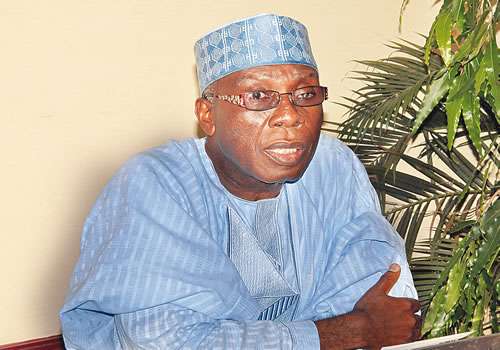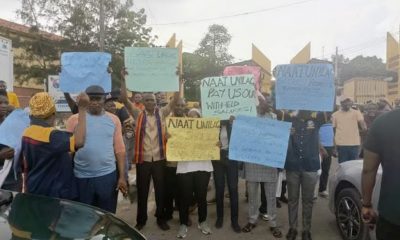Agribusiness
Ogbeh in search of agricultural change
Published
8 years agoon
By
Olu Emmanuel
• As Nigeria still imports 150m eggs monthly, spends N600m on fish import
WHEN Chief Innocent Audu Ogbeh came to office about a year ago he made it clear that “agriculture is the only option left to grow the economy” as Oil is failing the Country. Ogbeh promised Nigerians that in the month of April rice will become affordable, yet it remain unaffordable by the lower and middle classes it has become gold in the market. Tomato seasonal scarcity and high cost is becoming a norm, as it has entered its second season of scarcity this year.
Stakeholders say it is ‘the bite of change’. Changes they say don’t come easy. The frictions and knocks are what Nigerians are experiencing at the moment. According to the President, Muhammadu Buhari change will come, Nigerians should be patient.
The Minister recently reiterated that the country would be self-sufficient in rice and wheat production by 2019 while speaking at the ongoing Sectorial Debate on Nigerian Economy at the House of Representatives in Abuja, as he revealed that Nigeria is currently the highest producer of sorghum in the world.
He said that as for grains, the country will be self-sufficient in rice in the next two and half years and in wheat in the next three years. He also revealed that Nigeria is Number 4 in cashew production worldwide and currently generated over N242 billion from cashew nuts in 2015. He promised that his ministry would plant no fewer than two million cashew trees in 2016 and would continue the planting programme within the next four years.
ALSO SEE: Diamond Bank invests in agriculture, focuses on female farmers
However, Ogbeh owned up to the house, that Nigeria still spends N600m importing fish as that sector is not doing well. He complained also that the Poultry sector is also in a bad shape, noting that Nigeria still import about 150m eggs every month, as the nation still battles Avian flu due to lack of vaccines. More so Nigeria still spends N1 billion per annum on milk importations.
The minister thus advocated for the reduction of interest rates on agriculture loans to five or six per cent to encourage more borrowing and investment in the sector and regret that Nigerians reacted negatively to the idea on the importation of grass from Brazil announced earlier by the ministry, adding that the idea was aimed at promoting cow milk yields and fertility of cattle to boost local production of milk
Ogbeh said that the grass that Brazil is selling today came from Africa; which they took and worked on for 18 years and the grass now contain 18 per cent protein, trace elements and amino acids. He said that the ministry would soon forward a bill to the National Assembly to regulate the movement of animals in the country. Also stressing that the answer is not to allow grazing and roaming of cattle to continue, the country cannot afford it, even though it is a culture, but it has to come to an end because the conflict is simply unacceptable. On grazing reserves, he said that nine states had written to his ministry seeking Federal Government’s assistance to develop areas they had earmarked for reserves.
Ogbeh chase also called for the establishment of a commodity exchange in the country, adding that the exchange, when used with Genetically Modified Organisms (GMO) in the agriculture sector, would contribute immensely in the diversification of the country’s economy.
The minister appealed to the National Assembly to appropriate more funds in 2017 budget for the development of agriculture, saying that the sector had been poorly funded, stressing that apart from poor funding, the sector had suffered “stiff” resistance from investors who had been importing commodities into the country. The minister appealed to the house to partner the Executive to make amendments to various laws affecting agriculture so as to make it viable.
ALSO SEE: Poultry contributes over N1.6tr to Nigeria’s agric GDP — PAN President
Ogbeh in another chase, urges governors to provide irrigation facilities to boost agricultural production, as he revealed that the ministry was discussing with 10 states to produce 10 tonnes of rice per annum each to enable the country achieve self-sufficiency in rice production by 2019. The minister said this would be achieved only if states provide irrigation facilities as the country could not afford to depend on wet season agricultural activities alone and pleaded with the governors to help the Federal lead the way, providing irrigation facilities and helping the farmers achieve their targets.
Ogbeh told the house that the Governors of Kebbi, Kano, Jigawa, Anambra and many other stakeholders are getting involved in this programme, as Ogun ,Adamawa, Kogi, Taraba, Sokoto, Zamfara and Benue are to come on board in the next season.
National Daily wrote weeks ago ‘Politicking Policies’ as agricultural stakeholders complained that unstable policies are one of the greatest enemies of growth. On existing agricultural policy, Ogbeh said there would be no policy somersault, adding that he and his team would deepen the system well enough to add more value, adding that when a policy is doing well, there would be no reason for anybody to cancel what had been well done.
With these frantic chase, the song of BognusIkwe, his townsman ‘Cork Crows at Dawn’ readily comes to play, ‘will he ever get there, will he ever make it, will ever hear the sound of the cork crows at dawn’. Will the ministry of agriculture achieve the fits he is poised to, before the cork crows at the next election in 2019? Or better still how much bricks would Ogbeh have laid on the foundation that will be visibly commendable to all, before the Cork crows?
You may like


SSANU, NASU members block UNILAG gate over withheld salaries


The costly impotence of Buhari’s presidency


FG did not suspend removal of fuel subsidy because of 2023 elections – Femi Adesina


President Muhammadu Buhari on why he didn’t sign the electoral bill passed in NASS


Buhari’s six years’ score card horrible, failed in all sectors – Onovo


Buhari felicitates with Obasanjo at 84
Trending

 Football1 week ago
Football1 week agoGuardiola advised to take further action against De Bruyne and Haaland after both players ‘abandoned’ crucial game

 Health & Fitness1 day ago
Health & Fitness1 day agoMalaria Vaccines in Africa: Pastor Chris Oyakhilome and the BBC Attack

 Featured5 days ago
Featured5 days agoPolice reportedly detain Yahaya Bello’s ADC, other security details

 Comments and Issues7 days ago
Comments and Issues7 days agoNigeria’s Dropping Oil Production and the Return of Subsidy

 Education6 days ago
Education6 days agoEducation Commissioner monitors ongoing 2024 JAMB UTME in Oyo

 Business6 days ago
Business6 days agoMaida, university dons hail Ibietan’s book on cyber politics

 Crime6 days ago
Crime6 days agoPolice take over APC secretariat in Benue

 Business5 days ago
Business5 days agoDebt servicing gulps 56% of Nigeria’s tax revenue, says IMF

